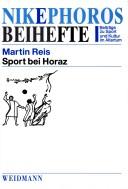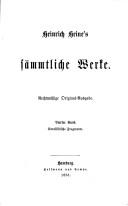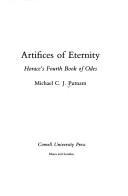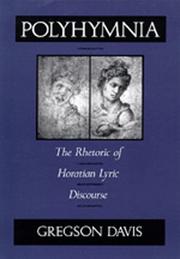| Listing 1 - 8 of 8 |
Sort by
|

ISBN: 3615001362 9783615001365 Year: 1994 Volume: 2 Publisher: Hildesheim Weidmann
Abstract | Keywords | Export | Availability | Bookmark
 Loading...
Loading...Choose an application
- Reference Manager
- EndNote
- RefWorks (Direct export to RefWorks)
Book
ISBN: 9791023105766 Year: 2019 Publisher: Paris: Sorbonne Université presses,
Abstract | Keywords | Export | Availability | Bookmark
 Loading...
Loading...Choose an application
- Reference Manager
- EndNote
- RefWorks (Direct export to RefWorks)
Dans les odes érotiques, Horace conjugue exaltation de la passion et morale de l'amour, élaborant une poétique tout à fait originale : il chante la puissance et les beautés du désir, mais n'en invite pas moins les jeunes filles à se marier, les matrones à être fidèles, les jeunes gens à se contrôler et les vieilles femmes à renoncer à l'amour. Il rompt ainsi avec la tradition qui le précède, de Sappho aux élégiaques latins en passant par Anacréon, Alcée ou Catulle. Pour comprendre cette intrustion de la morale dans le domaine érotique, il faut tenir compte de tout ce qui fonde la poétique d'Horace dans les Odes : l'ambition de devenir une voix de la cité, la nécessité de dire son adhésion au nouveau régime, mais aussi l'intérêt pour la philosophie, y compris l'Académie, dont on sous-évalue l'importance dans son œuvre. Les enjeux moraux sont cependant indissociables des choix poétiques. C'est en poète qu'Horace se fait philosophe, jouant sur la coïncidence de certains motifs proprement lyriques avec une morale d'origine philosophique. C'est également en poète qu'il réconcilie l'exaltation de la passion et la morale, grâce à un jeu sur les genres, les formes et leur pragmatique. Bénédicte Delignon éclaire la manière dont se tissent, dans les Odes, l'inspiration érotique, le substrat philosophique, le contexte politique et les choix poétiques de celui qui se regarde comme l'inventeur de la lyrique latine.
871 HORATIUS FLACCUS, QUINTUS --- Latijnse literatuur--HORATIUS FLACCUS, QUINTUS --- 871 HORATIUS FLACCUS, QUINTUS Latijnse literatuur--HORATIUS FLACCUS, QUINTUS --- Love in literature --- Moral conditions in literature --- Sex in literature --- Poetics --- Horace. --- Horace --- Horace - Carmina

ISBN: 3487074559 9783487074559 Year: 1983 Volume: 12 Publisher: Hildesheim Olms
Abstract | Keywords | Export | Availability | Bookmark
 Loading...
Loading...Choose an application
- Reference Manager
- EndNote
- RefWorks (Direct export to RefWorks)
Horace --- Latin poetry --- Poésie latine --- History and criticism --- Histoire et critique --- Technique --- Rhetoric, Ancient --- 871 HORATIUS FLACCUS, QUINTUS --- Classical languages --- Greek language --- Greek rhetoric --- Latin language --- Latin rhetoric --- Latijnse literatuur--HORATIUS FLACCUS, QUINTUS --- Rhetoric --- -Gorat︠s︡īĭ --- Gorat︠s︡iĭ Flakk, Kvint --- Horacij --- Horacio, --- Horacio Flaco, Q. --- Horacjusz --- Horacjusz Flakkus, Kwintus --- Horacy --- Horatius Flaccus, Quintus --- Horaṭiyos --- Horaṭiyus --- Horats --- Horaz --- Khorat︠s︡iĭ --- Khorat︠s︡iĭ Flak, Kvint --- Orazio --- Orazio Flacco, Quinto --- הוראציוס --- הורטיוס --- Rhetoric, Ancient. --- Technique. --- 871 HORATIUS FLACCUS, QUINTUS Latijnse literatuur--HORATIUS FLACCUS, QUINTUS --- -Horace --- Horacij Flakk, Kvint --- -Technique --- Poésie latine --- Ancient rhetoric --- Horatius Flaccus, Q. --- Gorat︠s︡īĭ --- Horace - Technique
Book
ISBN: 0521380197 9780521380195 Year: 1993 Publisher: Cambridge: Cambridge University Press,
Abstract | Keywords | Export | Availability | Bookmark
 Loading...
Loading...Choose an application
- Reference Manager
- EndNote
- RefWorks (Direct export to RefWorks)
English literature --- Comparative literature --- Horace --- 820 --- 871 HORATIUS FLACCUS, QUINTUS --- Classicism --- -English literature --- -Humanists --- -Scholars --- British literature --- Inklings (Group of writers) --- Nonsense Club (Group of writers) --- Order of the Fancy (Group of writers) --- Pseudo-classicism --- Aesthetics --- Literature --- Civilization, Classical --- Engelse literatuur --- Latijnse literatuur--HORATIUS FLACCUS, QUINTUS --- History and criticism --- Roman influences --- -Horace --- -Gorat︠s︡īĭ --- Gorat︠s︡iĭ Flakk, Kvint --- Horacij --- Horacio, --- Horacio Flaco, Q. --- Horacjusz --- Horacjusz Flakkus, Kwintus --- Horacy --- Horatius Flaccus, Quintus --- Horaṭiyos --- Horaṭiyus --- Horats --- Horaz --- Khorat︠s︡iĭ --- Khorat︠s︡iĭ Flak, Kvint --- Orazio --- Orazio Flacco, Quinto --- הוראציוס --- הורטיוס --- Influence --- Appreciation --- -Translations into English --- -History and criticism --- 871 HORATIUS FLACCUS, QUINTUS Latijnse literatuur--HORATIUS FLACCUS, QUINTUS --- 820 Engelse literatuur --- Horacij Flakk, Kvint --- -Engelse literatuur --- -Influence --- -820 Engelse literatuur --- Humanists --- Scholars --- Influence. --- Translations into English --- History and criticism. --- Great Britain --- Intellectual life. --- Horatius Flaccus, Q. --- 820 English literature. Literature in English --- English literature. Literature in English --- Gorat︠s︡īĭ --- Horace - influence exercée
Book
ISBN: 3406373364 9783406373367 Year: 1993 Publisher: München Beck
Abstract | Keywords | Export | Availability | Bookmark
 Loading...
Loading...Choose an application
- Reference Manager
- EndNote
- RefWorks (Direct export to RefWorks)
Horace --- Poets, Latin --- Biography --- Rome --- In literature --- History --- 871 HORATIUS FLACCUS, QUINTUS --- -Latin poets --- Latijnse literatuur--HORATIUS FLACCUS, QUINTUS --- Gorat︠s︡īĭ --- Gorat︠s︡iĭ Flakk, Kvint --- Horacij --- Horacio, --- Horacio Flaco, Q. --- Horacjusz --- Horacjusz Flakkus, Kwintus --- Horacy --- Horatius Flaccus, Quintus --- Horaṭiyos --- Horaṭiyus --- Horats --- Horaz --- Khorat︠s︡iĭ --- Khorat︠s︡iĭ Flak, Kvint --- Orazio --- Orazio Flacco, Quinto --- הוראציוס --- הורטיוס --- -Biography. --- In literature. --- Biography. --- Horace. --- 871 HORATIUS FLACCUS, QUINTUS Latijnse literatuur--HORATIUS FLACCUS, QUINTUS --- Horacij Flakk, Kvint --- -Latijnse literatuur--HORATIUS FLACCUS, QUINTUS --- Rim --- Roman Empire --- Roman Republic (510-30 B.C.) --- Romi (Empire) --- Byzantine Empire --- Rome (Italy) --- Horatius Flaccus, Quintus. --- Horatius Flaccus, Q. --- Poets, Latin - Biography --- Rome - In literature --- Rome - History - Augustus, 30 B.C.-14 A.D. - Biography

ISBN: 0801418526 9780801418525 Year: 1986 Volume: 43 Publisher: Ithaca, London : Cornell University Press,
Abstract | Keywords | Export | Availability | Bookmark
 Loading...
Loading...Choose an application
- Reference Manager
- EndNote
- RefWorks (Direct export to RefWorks)
Odes --- Rome in literature --- Laudatory poetry, Latin --- History and criticism --- Horace --- 871 HORATIUS FLACCUS, QUINTUS --- -Odes --- -Rome in literature --- Lyric poetry --- Poetry --- Latin laudatory poetry --- Latin poetry --- Latijnse literatuur--HORATIUS FLACCUS, QUINTUS --- Gorat︠s︡īĭ --- Gorat︠s︡iĭ Flakk, Kvint --- Horacij --- Horacio, --- Horacio Flaco, Q. --- Horacjusz --- Horacjusz Flakkus, Kwintus --- Horacy --- Horatius Flaccus, Quintus --- Horaṭiyos --- Horaṭiyus --- Horats --- Horaz --- Khorat︠s︡iĭ --- Khorat︠s︡iĭ Flak, Kvint --- Orazio --- Orazio Flacco, Quinto --- הוראציוס --- הורטיוס --- Odes, Latin --- Rome in literature. --- History and criticism. --- Horace. --- 871 HORATIUS FLACCUS, QUINTUS Latijnse literatuur--HORATIUS FLACCUS, QUINTUS --- Horacij Flakk, Kvint --- Rome --- In literature. --- Horace. Odes. IV. --- Horatius. Oden. IV. --- Odes - History and criticism --- Laudatory poetry, Latin - History and criticism --- Horace (quintus horatius flaccus), poete latin, 65-8 av. j.-c. --- Litterature latine --- Critique et interpretation --- Critique textuelle

ISBN: 0520070771 0520910303 0585139717 9780520910300 9780585139715 9780520070776 Year: 1991 Publisher: Berkeley University of California press
Abstract | Keywords | Export | Availability | Bookmark
 Loading...
Loading...Choose an application
- Reference Manager
- EndNote
- RefWorks (Direct export to RefWorks)
Horace's Odes have a surface translucency that belies their rhetorical sophistication. Gregson Davis brings together recent trends in the study of Augustan poetry and critical theory and deftly applies them to individual poems. Exploring four rhetorical strategies--what he calls modes of assimilation, authentication, consolation, and praise and dispraise--Davis produces enlightening, new interpretations of this classic work. Polyhymnia, named after one of the Muses invoked in Horace's opening poem, revises the common image of Horace as a complacent, uncomplicated, and basically superficial singer. Focusing on the artistic persona--the lyric "self" that is constituted in the text--Davis explores how the lyric speaker constructs subtle "arguments" whose building-blocks are topoi, recurrent motifs, and generic conventions. By examining the substructure of lyric argument in groupings of poems sharing similar strategies, the author discloses the major principles that inform Horatian lyric composition.
871 HORATIUS FLACCUS, QUINTUS --- Laudatory poetry, Latin --- -Odes --- -Rhetoric, Ancient --- Classical languages --- Greek language --- Greek rhetoric --- Latin language --- Latin rhetoric --- Lyric poetry --- Poetry --- Latin laudatory poetry --- Latin poetry --- 871 HORATIUS FLACCUS, QUINTUS Latijnse literatuur--HORATIUS FLACCUS, QUINTUS --- Latijnse literatuur--HORATIUS FLACCUS, QUINTUS --- History and criticism --- Rhetoric --- Horace --- Orazio --- Horacij Flakk, Kvint --- Rome --- In literature. --- Odes, Latin --- Rhetoric, Ancient. --- History and criticism. --- Odes --- Rhetoric, Ancient --- Greek & Latin Languages & Literatures --- Languages & Literatures --- Horace. --- Technique. --- Ancient rhetoric --- Horatius Flaccus, Q. --- Horatius Flaccus, Quintus --- Gorat︠s︡īĭ --- Gorat︠s︡iĭ Flakk, Kvint --- Horacij --- Horacio, --- Horacio Flaco, Q. --- Horacjusz --- Horacjusz Flakkus, Kwintus --- Horacy --- Horaṭiyos --- Horaṭiyus --- Horats --- Horaz --- Khorat︠s︡iĭ --- Khorat︠s︡iĭ Flak, Kvint --- Orazio Flacco, Quinto --- הוראציוס --- הורטיוס --- Laudatory poetry, Latin - History and criticism. --- Odes, Latin - History and criticism.
Book
ISBN: 0691601992 0691031665 0691631581 1400852935 9780691031668 Year: 1993 Publisher: Princeton (N.J.) : Princeton university press,
Abstract | Keywords | Export | Availability | Bookmark
 Loading...
Loading...Choose an application
- Reference Manager
- EndNote
- RefWorks (Direct export to RefWorks)
In laying the groundwork for a fresh and challenging reading of Roman satire, Kirk Freudenburg explores the literary precedents behind the situations and characters created by Horace, one of Rome's earliest and most influential satirists. Critics tend to think that his two books of Satires are but trite sermons of moral reform--which the poems superficially claim to be--and that the reformer speaking to us is the young Horace, a naive Roman imitator of the rustic, self-made Greek philosopher Bion. By examining Horace's debt to popular comedy and to the conventions of Hellenistic moral literature, however, Freudenburg reveals the sophisticated mask through which the writer distances himself from the speaker in these earthy diatribes--a mask that enables the lofty muse of poetry to walk in satire's mundane world of adulterous lovers and quarrelsome neighbors. After presenting the speaker of the diatribes as a stage character, a version of the haranguing cynic of comedy and mime, Freudenburg explains the theoretical importance of such conventions in satire at large. His analysis includes a reinterpretation of Horace's criticisms of Lucilius, and ends with a theory of satire based on the several images of the satirist presented in Book One, which reveals the true depth of Horace's ethical and philosophical concerns.Originally published in 1992.The Princeton Legacy Library uses the latest print-on-demand technology to again make available previously out-of-print books from the distinguished backlist of Princeton University Press. These editions preserve the original texts of these important books while presenting them in durable paperback and hardcover editions. The goal of the Princeton Legacy Library is to vastly increase access to the rich scholarly heritage found in the thousands of books published by Princeton University Press since its founding in 1905.
Latin wit and humor --- 871 HORATIUS FLACCUS, QUINTUS --- -Latin verse satire --- Latijnse literatuur--HORATIUS FLACCUS, QUINTUS --- -Gorat︠s︡īĭ --- 871 HORATIUS FLACCUS, QUINTUS Latijnse literatuur--HORATIUS FLACCUS, QUINTUS --- -Latijnse literatuur--HORATIUS FLACCUS, QUINTUS --- Aesthetics, Ancient --- Comic, The, in literature --- Verse satire, Latin --- Latin verse satire --- Latin poetry --- Latin literature --- History and criticism&delete& --- Theory, etc --- Horace. --- Horace --- Orazio --- Horacij Flakk, Kvint --- Aesthetics. --- Rome --- In literature. --- Horatius Flaccus, Quintus --- Horatius Flaccus, Q. --- Comic, The, in literature. --- Aesthetics, Ancient. --- History and criticism --- Theory, etc. --- Rome in literature. --- Gorat︠s︡īĭ --- Gorat︠s︡iĭ Flakk, Kvint --- Horacij --- Horacio, --- Horacio Flaco, Q. --- Horacjusz --- Horacjusz Flakkus, Kwintus --- Horacy --- Horaṭiyos --- Horaṭiyus --- Horats --- Horaz --- Khorat︠s︡iĭ --- Khorat︠s︡iĭ Flak, Kvint --- Orazio Flacco, Quinto --- הוראציוס --- הורטיוס --- Verse satire, Latin - History and criticism - Theory, etc. --- Latin wit and humor - History and criticism - Theory, etc.
| Listing 1 - 8 of 8 |
Sort by
|

 Search
Search Feedback
Feedback About UniCat
About UniCat  Help
Help News
News